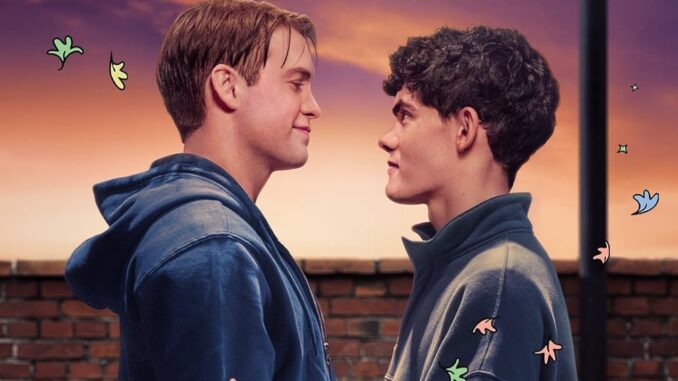
By Eden Lawrence
Netflix’s coming-of-age, queer teen love story, “Heartstopper,” aired its third season on Oct. 3. The show, based on the graphic novel of the same name by Alice Oseman, follows Nick Nelson, Charlie Spring, and their friends as they navigate high school and discover their sexualities and identities. One of my favorite things about Heartstopper is that it shows queer love in a positive light. A lot of shows with queer characters tend to make those characters go through hardships solely based on their sexuality, making the characters feel very one-dimensional. This isn’t to say there are no homophobic characters in Heartstopper or that they don’t face queer-related problems, but for the most part, the characters get to express themselves and love freely, which is something that should be the standard.
I thought this season was great and explored different avenues. While the show focuses on Nick and Charlie, the subplots that focus on their friends are both endearing and entertaining. Viewers were able to see a wide range of topics discussed this season. The most significant of the main plots in Heartstopper this season was Nick and Charlie telling each other “I love you” for the first time. Viewers have watched the relationship blossom since the first episode in 2022, and watching them say those three words made us feel warm inside. It pulled us in closer to see what other moments they’ll share and set the tone for the subsequent episodes.
For starters, we saw Charlie confront his struggles with an eating disorder. I think Netflix portrayed eating disorders well. There seemed to be a lot of thought put into how to bring the topic up and also educate people on something they might have been unaware of. It was foreshadowed in season two that Charlie was having difficulties with food and it played out this season from different angles. Not only did we see how it affected Charlie, but his family and friends as well. We see Charlie’s ups and downs as he lashes out at those who try to help, a common action with those struggling with eating disorders. The people close to Charlie still try their hardest to be there for him. Charlie accepting help from not just his family but health professionals shows his wanting to get better.
This season also gave us more of Tao Xu and Elle Argent. Elle is a transgender woman who is in a relationship with Tao. Their relationship gets put to the test this season as they seek to explore the physical aspect of their relationship. This opened up a conversation about Elle’s gender dysphoria, distress a person experiences due to a mismatch between their gender identity and their gender assigned at birth. Again, this is brought up and handled in a mature way that puts viewers in Elle’s shoes for a few seconds.
Another great feature was the flourishing sapphic relationship between Tara Jones and Darcy Olsson. Tara and Darcy’s story was smooth sailing in the first season, but there was a rough patch in season two in dealing with Darcy’s mother. In season three, viewers got to witness the fallout following the situation and how Darcy and Tara handled it. Throughout this season, Darcy made more discoveries regarding her gender identity. Against all odds, the two characters love each other; they communicate effectively, especially when they have issues.
And then, there was the loveable character Isaac Henderson, who navigated his self-discovery of being asexual. Isaac is one of my favorite characters because aroace–aromantic asexual–representation is very sparse in mass media. All people must be able to see parts of themselves represented in the media.
One thing that I loved about Isaac’s story is that his love for his friends was at the forefront. There is a common misconception that people who fall under the aroace spectrum are incapable of loving anyone. Heartstopper puts those rumors to bed as it depicts how deeply Isaac cares about the people around him.
While I loved this season of Heartstopper, my only complaint is the episode count. Netflix’s decision to make seasons with very few episodes really does hinder the show; it feels like there were more subjects that needed to be expanded on. But, given their short time frame, many of the side-story arcs had to be wrapped up in one final episode. Despite this, it doesn’t change my feelings about the season or the show as a whole. I think Heartstopper is a great, easy-to-watch show with accurate, nuanced representation that many people can enjoy.
Originally, Netflix had picked up Heartstopper for only three seasons, but due to its popularity and plethora of stories to be told, it’s looking certain that a fourth season will be coming in the future. Oseman released the fifth book of the series last year, and the sixth one is set to be the last.
